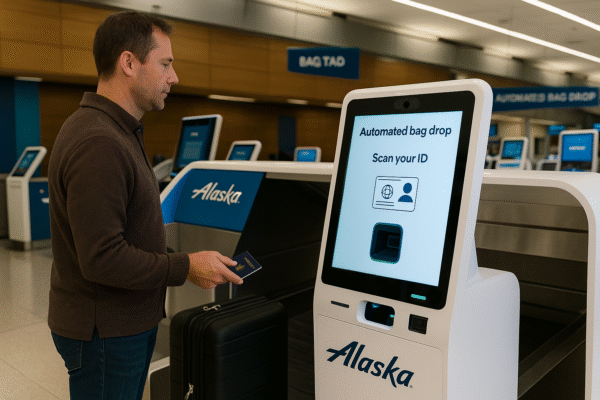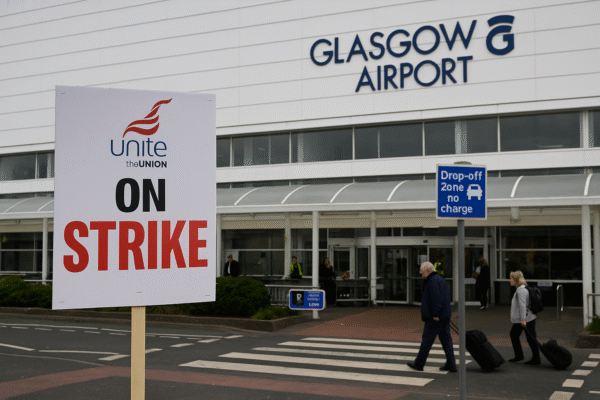Glasgow Airport Braces for Disruption as Workers Confirm July Strike Over Pay Dispute
More than 100 key workers at Glasgow Airport are set to stage a 48-hour strike from Wednesday, July 24, to Friday, July 26, in a move that threatens to throw summer travel plans into chaos for thousands of UK holidaymakers. The action comes after weeks of stalled negotiations between Glasgow Airport management and the Unite trade union, which represents engineers, airside support officers, and passenger service staff.
The strike—announced on July 11—follows a near-unanimous vote in favour of industrial action, with 98.7% of Unite members backing the walkout. The union says its members have rejected a 4% pay offer, citing rising inflation and the airport’s post-pandemic recovery as reasons to demand a fairer wage settlement.
Why the Strike Matters for Travellers
Although relatively small in number, the striking workers occupy critical operational roles, such as engineering, baggage handling, and passenger safety coordination. Their absence could have widespread ripple effects, slowing check-in processes, security screening, and ground operations.
Glasgow Airport, which serves over 8.7 million passengers annually and is Scotland’s second-busiest hub after Edinburgh, is a major gateway for domestic and international travel. With the summer season peaking, any disruption could lead to flight delays, cancellations, and longer queues.
Unite Union: “Workers Deserve More”
Sharon Graham, Unite’s General Secretary, said in a statement that the union would “fully back” its members and continue to push for better conditions. “Glasgow Airport workers are essential to daily operations and deserve fair pay that reflects their contribution and rising living costs. The refusal to improve the offer is unacceptable.”
The union also criticized Glasgow Airport’s approach to negotiations, arguing that other companies operating within the airport—such as ICTS and Menzies Aviation—have already agreed to pay increases through separate deals. This inconsistency, they argue, further highlights management’s unwillingness to act in good faith.
Glasgow Airport’s Response and Contingency Plans
In a statement issued on July 12, Glasgow Airport management said it was “disappointed” with the decision to strike and emphasized its commitment to maintaining safe and efficient operations during the strike period. The airport is reportedly working on contingency measures, including redeploying supervisory staff and engaging temporary contractors to minimize passenger disruption.
A Glasgow Airport spokesperson stated:
“We value the work of all our employees and have worked hard to reach a fair offer. We remain open to continued dialogue with Unite to avoid disruption to our passengers.”
However, without a revised pay offer on the table, union officials say the strike is likely to proceed as planned.
Government and Passenger Concerns Mount
The strike has sparked concern from both Scottish government transport officials and the UK’s Civil Aviation Authority (CAA), which have urged both sides to return to talks. While the government cannot directly intervene in private-sector pay disputes, Transport Scotland has emphasized the importance of maintaining stability at one of the country’s critical transport hubs.
Holidaymakers, especially families traveling during the peak school break, have taken to social media to express worry over possible delays and flight cancellations. Some have already begun altering their plans, booking earlier departures or considering travel from Edinburgh or Prestwick Airports.
What Should Passengers Do?
Passengers flying in or out of Glasgow Airport between July 24 and 26 are advised to:
- Monitor airline communications for updates
- Arrive at the airport earlier than usual
- Recheck baggage rules and allowances, as delays at security may occur
- Consider flexible booking options if purchasing new flights
Airlines including easyJet, Ryanair, Jet2, and British Airways operate frequent routes from Glasgow, and many will be required to update passengers in real time if delays or rebookings become necessary.
Wider Pattern of Industrial Action Across UK Airports
The Glasgow Airport strike reflects a wider trend of labor unrest across the UK aviation sector in 2024–2025. Workers at other major UK hubs—including London Heathrow, Manchester Airport, and Bristol Airport—have also raised demands for improved pay in recent months. Unite and other unions have successfully negotiated improved deals at several sites, but Glasgow’s current stalemate remains unresolved.
Looking Ahead: Will Talks Resume?
There remains a narrow window for resolution. Unite officials have said they are open to negotiations at any time, but only if airport management returns with a meaningful revised offer. Without this, the 48-hour strike could mark just the beginning of more prolonged action throughout the peak summer season.
A further escalation could involve rolling strikes or additional dates later in July or August, creating even more uncertainty for travelers and putting pressure on airport leadership to respond.
Conclusion: Prepare for Disruption, Hope for Resolution
The scheduled Glasgow Airport strike marks a critical juncture in the battle over fair pay and working conditions for Scotland’s airport staff. As the clock ticks toward July 24, passengers are left watching closely, hoping that last-minute talks can prevent a crisis at the heart of Scotland’s summer tourism season.
For more travel news like this, keep reading Global Travel Wire



















